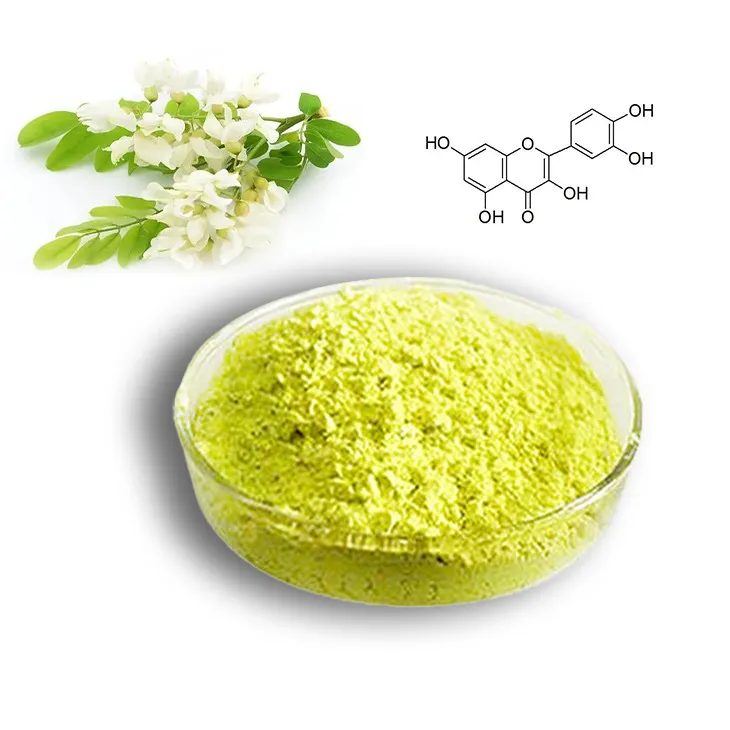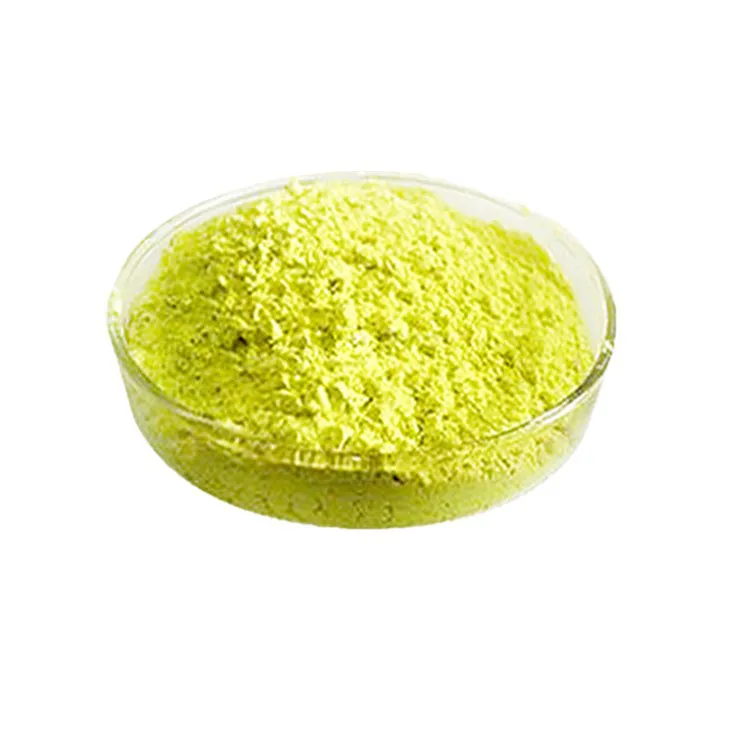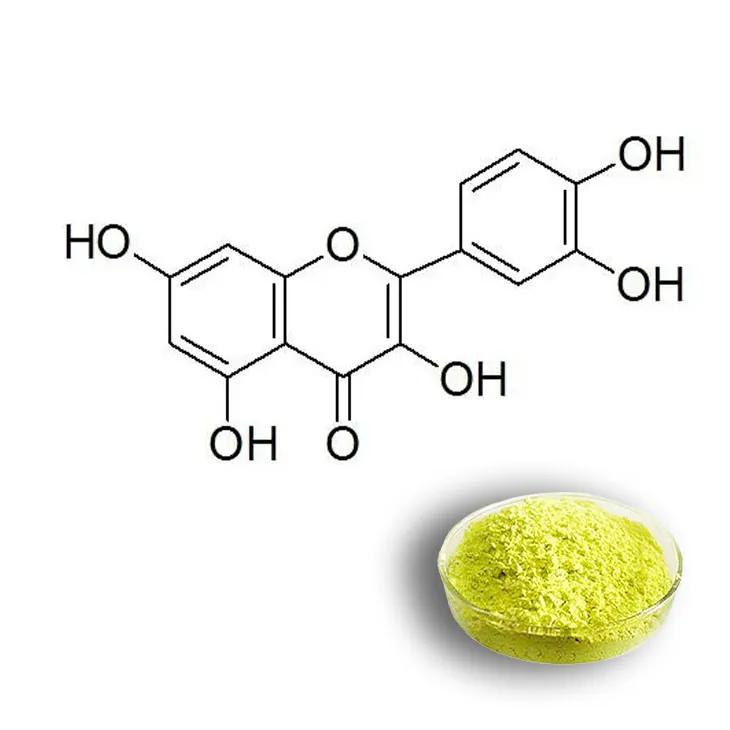- 0086-571-85302990
- sales@greenskybio.com
Heard of quercetin? 5 unexpected health benefits.
2024-11-12

Introduction
Quercetin is a flavonoid, a type of natural bioactive compound found in many fruits, vegetables, and grains. It has been the subject of numerous scientific studies due to its potential health - promoting properties. In this article, we will delve into five unexpected health benefits of Quercetin that you may not be aware of.

1. Immune System Support
Quercetin plays a significant role in supporting the immune system. It has antioxidant and anti - inflammatory properties that can help the body fend off infections.
- Antioxidant Activity: As an antioxidant, quercetin helps to neutralize free radicals in the body. Free radicals are unstable molecules that can damage cells and weaken the immune system. By reducing oxidative stress, quercetin allows the immune cells to function more effectively.
- Anti - Inflammatory Effects: Chronic inflammation can suppress the immune system. Quercetin has been shown to reduce inflammation by inhibiting certain enzymes and signaling molecules involved in the inflammatory process. This helps to create a more favorable environment for the immune system to operate.
- Immune Cell Modulation: Quercetin can also directly affect immune cells. It has been found to enhance the function of white blood cells, such as macrophages and neutrophils, which are crucial for fighting off pathogens. For example, it can increase the phagocytic activity of macrophages, enabling them to better engulf and destroy bacteria and other foreign invaders.

2. Cardiovascular Health Protection
Another important benefit of quercetin is its positive impact on cardiovascular health.
- Blood Pressure Regulation: Quercetin may help in reducing blood pressure. It does this by relaxing the smooth muscles in the blood vessels, which in turn widens the blood vessels and improves blood flow. Studies have shown that regular consumption of quercetin - rich foods or supplements may lead to a modest decrease in systolic and diastolic blood pressure.
- Cholesterol Management: Quercetin can also influence cholesterol levels in the body. It has been found to lower LDL (low - density lipoprotein) cholesterol, often referred to as "bad" cholesterol, while increasing HDL (high - density lipoprotein) cholesterol, the "good" cholesterol. This helps to maintain a healthy lipid profile and reduces the risk of developing heart disease.
- Anti - platelet Aggregation: Platelet aggregation, or the clumping together of platelets in the blood, can lead to the formation of blood clots. Quercetin has anti - platelet properties, which means it can prevent platelets from sticking together too easily. This reduces the risk of thrombosis, a condition where a blood clot forms and blocks a blood vessel, which can cause serious cardiovascular problems such as heart attacks and strokes.

3. Anti - cancer Potential
Quercetin has shown promising anti - cancer properties in pre - clinical and some clinical studies.
- Cancer Cell Inhibition: Quercetin has been found to inhibit the growth and proliferation of various cancer cells. It can interfere with the cell cycle of cancer cells, preventing them from dividing and multiplying uncontrollably. For example, in breast cancer cells, quercetin has been shown to block the progression of the cell cycle at specific checkpoints, leading to cell death.
- Apoptosis Induction: One of the ways quercetin may fight cancer is by inducing apoptosis, or programmed cell death, in cancer cells. This is a natural process by which the body gets rid of damaged or abnormal cells. Quercetin can activate certain signaling pathways in cancer cells that trigger apoptosis, while leaving normal cells relatively unaffected.
- Anti - angiogenic Effects: Tumors need a blood supply to grow and spread. Quercetin has anti - angiogenic properties, meaning it can prevent the formation of new blood vessels that tumors rely on for nourishment. By cutting off the blood supply, quercetin can starve tumors and limit their growth and metastasis.

4. Anti - diabetic Effects
Quercetin also offers potential benefits for those with diabetes or at risk of developing diabetes.
- Blood Glucose Regulation: Quercetin can help regulate blood glucose levels. It may improve insulin sensitivity, allowing cells to better respond to insulin and take up glucose from the blood. This can be beneficial for individuals with type 2 diabetes, where insulin resistance is a common problem. In some studies, quercetin supplementation has been shown to lead to a reduction in fasting blood glucose levels.
- Prevention of Diabetic Complications: Diabetes can lead to various complications, such as nerve damage, kidney disease, and eye problems. Quercetin's antioxidant and anti - inflammatory properties may help prevent these complications. For example, it can protect the nerves from oxidative stress and inflammation, reducing the risk of diabetic neuropathy. It can also protect the kidneys by reducing inflammation and oxidative damage in the renal tissue.
5. Neuroprotective Properties
Finally, quercetin has neuroprotective properties that can benefit the brain and nervous system.
- Oxidative Stress Reduction in the Brain: The brain is highly vulnerable to oxidative stress due to its high metabolic rate and the presence of large amounts of polyunsaturated fatty acids. Quercetin, as an antioxidant, can penetrate the blood - brain barrier and reduce oxidative stress in the brain. This can help protect neurons from damage and may be beneficial in preventing neurodegenerative diseases such as Alzheimer's and Parkinson's.
- Anti - inflammatory Effects in the Nervous System: Inflammation in the nervous system can contribute to various neurological disorders. Quercetin's anti - inflammatory properties can help reduce inflammation in the brain and spinal cord. It can inhibit the activation of microglia, the immune cells of the central nervous system, which play a role in neuroinflammation.
- Cognitive Function Improvement: Some studies suggest that quercetin may have a positive impact on cognitive function. It may enhance memory, learning, and attention. Although more research is needed in this area, the potential of quercetin for improving brain health is an exciting area of study.
Conclusion
Quercetin is a remarkable bioactive compound with a wide range of health benefits. From supporting the immune system and protecting the heart to potentially fighting cancer and protecting the brain, it has much to offer for overall health and well - being. However, it's important to note that while quercetin shows great promise, more research is still needed to fully understand its mechanisms of action and to determine the optimal dosage for different health conditions. Incorporating quercetin - rich foods such as apples, onions, and berries into your diet is a natural and healthy way to potentially reap these benefits.
FAQ:
What is quercetin?
Quercetin is a bioactive compound. It is a type of flavonoid, which is a natural substance found in many plants. It can be obtained from foods such as fruits, vegetables, and grains.
How does quercetin support the immune system?
Quercetin has antioxidant and anti - inflammatory properties. It can help modulate the immune response by reducing inflammation and oxidative stress. It may also enhance the function of immune cells, such as white blood cells, which play a crucial role in fighting off infections.
What diseases can quercetin protect against?
Quercetin may offer protection against certain chronic diseases. For example, it may help reduce the risk of heart disease by improving blood lipid levels and reducing blood pressure. It also has potential anti - cancer properties as it can inhibit the growth and spread of cancer cells in some cases. Additionally, it may be beneficial in preventing neurodegenerative diseases like Alzheimer's and Parkinson's due to its antioxidant effects.
How can one get enough quercetin in their diet?
One can consume foods rich in quercetin. Fruits like apples, berries (such as blueberries and strawberries), and citrus fruits are good sources. Vegetables such as onions, kale, and broccoli also contain quercetin. Whole grains like oats and buckwheat are another option. Consuming a diverse diet with plenty of these plant - based foods can ensure an adequate intake of quercetin.
Are there any side effects of quercetin?
In general, when consumed in normal amounts through food, quercetin is considered safe. However, when taken in high - dose supplements, some people may experience side effects such as stomach upset, headache, or allergic reactions. It's always advisable to consult a healthcare provider before starting any new supplement.
Related literature
- Quercetin: A Promising Molecule for Health"
- "The Role of Quercetin in Disease Prevention"
- "Quercetin: Sources, Benefits, and Safety Considerations"
- ▶ Hesperidin
- ▶ citrus bioflavonoids
- ▶ plant extract
- ▶ lycopene
- ▶ Diosmin
- ▶ Grape seed extract
- ▶ Sea buckthorn Juice Powder
- ▶ Beetroot powder
- ▶ Hops Extract
- ▶ Artichoke Extract
- ▶ Reishi mushroom extract
- ▶ Astaxanthin
- ▶ Green Tea Extract
- ▶ Curcumin Extract
- ▶ Horse Chestnut Extract
- ▶ Other Problems
- ▶ Boswellia Serrata Extract
- ▶ Resveratrol Extract
- ▶ Marigold Extract
- ▶ Grape Leaf Extract
- ▶ blog3
-
Cranberry Plants and Skin - care Products.
2024-11-12
-
Peppermint Oil
2024-11-12
-
Giant Knotweed Extract
2024-11-12
-
Natural grape seed extract
2024-11-12
-
Coix Seed Extract
2024-11-12
-
Bamboo Leaf extract
2024-11-12
-
Oyster Mushroom Extract Powder
2024-11-12
-
Panax Ginseng Leaf Extract
2024-11-12
-
Mulberry Extract
2024-11-12
-
Tinospora cordifolia extract
2024-11-12
-
Medicinal Marshmallow Extract
2024-11-12





















